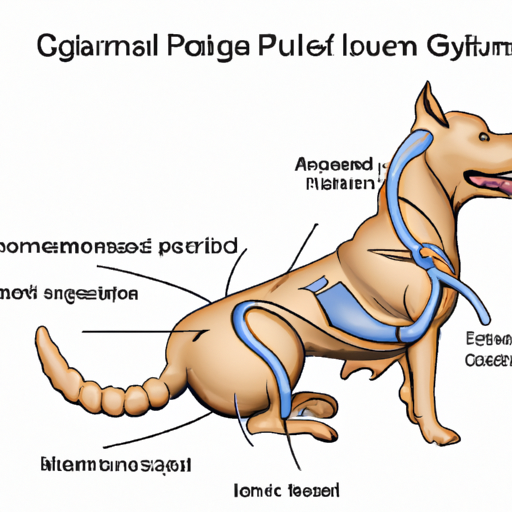Understanding Canine Gastric Dilatation-Volvulus (GDV)
As a caregiver, you’re not just responsible for the physical well-being of your furry friend, but also their emotional comfort. One of the scariest medical emergencies that can happen to a dog is Gastric Dilatation-Volvulus (GDV), more commonly known as a “flipped stomach”.
In simplest terms, a dog’s stomach flips when it twists, causing gas and food to build up with no way to escape. This can lead to a rapid expansion of the stomach, putting pressure on other organs and potentially leading to life-threatening complications.
Now, let’s delve into the intricacies of this condition, the symptoms to look for, prevention strategies, and what to do if your dog’s stomach flips.
Symptoms to Look For
If your dog’s stomach flips, they may exhibit a number of symptoms:
- Excessive drooling
- Restlessness or pacing
- An enlarged or bloated abdomen
- Attempts to vomit without producing anything
- Signs of pain such as whining or groaning
These symptoms can occur rapidly, often within a matter of hours, and require immediate veterinary attention.
Breeds at High Risk
While any breed can suffer from a flipped stomach, some breeds are more susceptible than others. Larger breeds with deep chests like:
- Great Danes
- German Shepherds
- Boxers
- Labrador Retrievers
are especially at risk. However, don’t let this fool you into complacency if your dog is of a different breed. Always stay vigilant!
Preventive Measures
Though GDV is primarily a spontaneous condition, there are preventive measures you can take:
- Feed your dog smaller, more frequent meals instead of one large one.
- Avoid rigorous exercise before and after meals.
- Encourage slow eating by using a slow feeder bowl.
- Avoid feeding your dog from a raised bowl unless advised by a vet.
When Emergency Strikes
If you suspect your dog’s stomach has flipped, seek immediate veterinary assistance. No home treatment can replace professional help. Your vet will likely need to perform emergency surgery to untwist the stomach and prevent further complications.
Frequently Asked Questions
What causes a dog’s stomach to flip?
While the exact cause is unknown, factors such as eating a large meal followed by vigorous exercise can contribute to the condition.
Can a dog survive a flipped stomach?
Yes, but immediate veterinary intervention is crucial. Delayed treatment can be fatal.
Is a flipped stomach painful for dogs?
Yes, a flipped stomach can cause significant discomfort and pain for dogs.
Can small breed dogs suffer from a flipped stomach?
Yes, while it’s less common, small breed dogs can also suffer from a flipped stomach.
Whatever the breed or size of your dog, always remember: early detection and prompt action can save lives. As a caregiver, you play a critical role in ensuring the health and happiness of your four-legged family member. Stay informed, stay vigilant, and stay loving.



